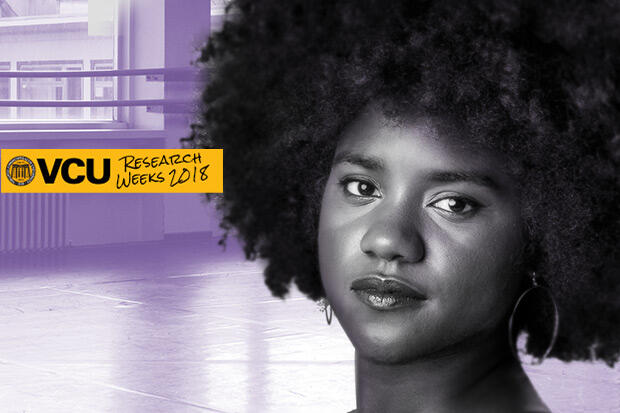
April 11, 2018
VCU student researcher explores dance as a method for combating racial inequalities and social constructs
Share this story
As part of Research Weeks (April 6–27) we are highlighting the work of six undergraduates whose work was made possible by VCU’s Undergraduate Research Opportunities Program, Global Education Office, Division for Inclusive Excellence and guidance from faculty members.
Research Weeks takes place on both campuses and features a wide variety of projects in multiple disciplines.
See more stories by clicking on links in the “Related stories” section or learn more about the lineup of events for this year’s Research Weeks.
Dance can be a vehicle for examining class and racial divides in the United States and healing those wounds, a Virginia Commonwealth University student researcher has found.
Christine Wyatt, a senior who majors in dance and choreography in the School of the Arts, employs the art form to improve dialogue about race and class and how the concepts inform American society and art. Wyatt includes Africanist-influenced movements in her work. She brings attention to the fact that Eurocentric approaches often dominate formal dance education in the U.S., even though dances of Africa and enslaved Africans in the Americas also have shaped the art form in this country.
Wyatt calls this investigative process “decolonizing dance.” In her eyes, dance education in the United States could help bring greater inclusivity to art and society. Decolonizing can be an abstract term that entails “undoing racial and class structures” within dance and society, Wyatt said.
“Decolonizing through dance is about undoing colonization in my daily life,” she said. “Colonization represents the concept of power struggles and dynamics that come up in dance. I found that when you’ve recognized there is an injustice, whether it’s in an entire education system or in a dance class, you have to recognize that it is flawed.”
To develop these ideas and practice them in her choreography and everyday life, in 2017 Wyatt attended the Summer Leadership Institute of the Urban Bush Women dance company. The Brooklyn-based group specializes in African-American dance theater and emphasizes community outreach and equity in dance. The Summer Leadership Institute teaches dancers, choreographers and activists to employ dance to empower themselves and the disenfranchised.

Wyatt said she used the skills learned in the program to express her racial identity in her choreography and to work collaboratively with other dancers. For 10 days, internationally and racially diverse participants questioned what race and power structures mean in American society and how these barriers manifest in artistic communities.
“We went through the process of discussing what are prejudice, discrimination and racism,” she said. “We asked questions such as, Does race exist? During the conversation, Urban Bush Women provided a lot of historical context and information for the digging we were doing.”
Wyatt will express her musings in MEANS WITHIN, the Spring 2018 Senior Project Concert, which is the culmination of her education in dance and choreography. Wyatt and seven student choreographers will showcase pieces performed by VCU dancers that explore how people deal with constructs and challenges. Wyatt’s work “Ti’ed” alludes to the colloquial pronunciation of the word tired, which represents the speaker being so exhausted, he or she drops the ‘r’ sound. Wyatt intends to expose the social, psychological and political sources of fatigue felt by the disenfranchised. The piece is inspired by civil and voting rights activist Fannie Lou Hamer, who coined the phrase “I’m sick and tired of being sick and tired.”
Wyatt said VCU is the ideal place to premiere “Ti’ed” and to begin pushing for social change.
“The thing that drew me to VCU was we make it real. In dance, we find out what that means on a very deep level,” she said. “We are constantly making ourselves better through dance, building community and finding community. For me, that is what making it real has been at VCU.”
Subscribe to VCU News
Subscribe to VCU News at newsletter.vcu.edu and receive a selection of stories, videos, photos, news clips and event listings in your inbox.












